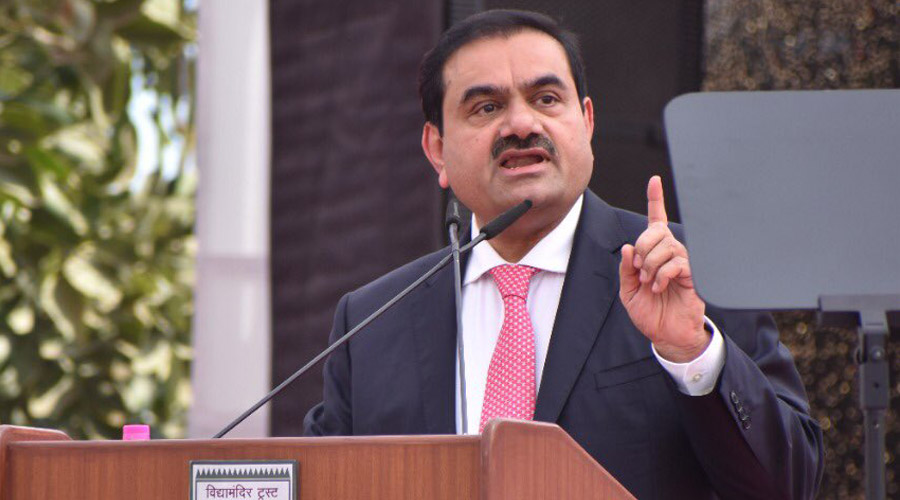India’s top finance ministry bureaucrat, the Reserve Bank of India, bourse authorities and a clutch of Wall Street banks and global credit rating agencies joined forces on Friday to stop the Adani trainwreck from careening into another week.
The Narendra Modi government, which has been under attack over the crisis that has engulfed the Adani group, had been shocked into silence after l’affaire Adani overshadowed Nirmala Sitharaman’s budget, unsure whether any comment or move over the $100-billion meltdown in Gautam Adani’s stocks during a weeklong bonfire of vanities would invite a greater fusillade from the Opposition.
But on Friday, all caution and scruples were abandoned in a concerted move at damage control by sending out the strongest message till date that “Everything Is OK”.
Finance secretary T.V. Somanathan characterised the market mayhem as a “storm in a teacup” from a macroeconomic perspective.
“There is absolutely no concern from the point of view of financial stability, either for depositors, or for policyholders, or for anyone holding shares in these institutions. The share of any one company is not such as to create any impact at the macro level and so there is absolutely no concern from that point of view,” he told PTI in a post-budget interview.
“They (the Adani group) are a sideshow. They are of interest to those who are interested in stock markets and investment. From a macroeconomic point of view, this is a non-issue.... It’s a storm in a teacup as far as macroeconomics is concerned.”
Late in the evening, the Reserve Bank of India came out with a statement in which it said the banking sector was “resilient and stable” — issuing a rare clarification in response to media reports “expressing concern about the exposures of Indian banks to a business conglomerate”. On Thursday, the RBI had asked the banks to provide details of their exposure to the Adani group. Now the banking regulator has come out with its ringing endorsement within 24 hours.
“Various parameters relating to capital adequacy, asset quality, liquidity, provision coverage and profitability are healthy,” the RBI said as the authorities tried to quell the noise over the Adani crisis and soothe the nerves of fretting investors.
The day had begun with Wall Street giants Goldman Sachs Group and JPMorgan Chase &Co telling their clients that the dollar-denominated bonds floated by the Adani entities — which had crumbled to near distress levels earlier in the week — could still offer value on the strength of underlying assets.
As a result, all 15 dollar-debt securities of the group advanced on Friday, partly helped by reports that Adani Ports & Special Economic Zone Ltd had made coupon payments on schedule.
The 2031 notes sold by Adani Ports, one of those which had a payment date on Feb. 2, climbed 3.7 cents on the dollar to 67.7 cents as of 10.50am in Hong Kong.
Fitch Ratings came out with a strong vote of confidence in the Adani group. “There is no immediate impact on the ratings of the Fitch-rated Adani entities and their securities following a short-seller report alleging malpractices at India’s Adani Group, and expects no material changes to its forecast cash flow,” it said.
But late in the evening, there was a bit of a wobble when Standard and Poor’s cut its rating outlook on Adani Ports and Special Economic Zone (APSEZ) and Adani Electricity to negative from stable.
“The negative outlook reflects the risk of a deterioration in the credit profile of Adani Ports and Adani Electricity Mumbai due to governance risks and funding challenges for the larger Adani Group,” S&P said in a statement.
Earlier in the day, Moody’s Investor Service also expressed some reservations about the Adani group’s ability to raise funds in the near future. “These adverse developments are likely to reduce the group’s ability to raise capital to fund committed capital expenditure or refinance maturing debt over the next 1-2 years,” Moody’s said.
Tighter curbs
On Thursday, stock exchange authorities triggered the additional surveillance mechanism (ASM) on three stocks – Adani Enterprises, Adani Ports, and Ambuja Cements – requiring the biggest traders in these counters to stump up a 100 per cent upfront margin on their open positions in an effort to stop short sellers from steepening the slide.
The action didn’t seem to work — at least initially — as flagship company Adani Enterprises’ stock tumbled to a 52-week low of Rs 1017.10 in early trades.
Adani Ports and Special Economic Zone, Adani Transmission, Adani Green Energy, Adani Total Gas and Ambuja Cement all hit 52-week lows as well.
But by the close of trading, most of the Adani stocks were able to grind out gains. Adani Enterprises closed at Rs 1584.20, up 1.25 per cent from Thursday’s close. Ambuja Cement closed up 6 per cent at Rs 373.70 while Adani Ports leapt almost 8 per cent to Rs 498.85. However, Adani Transmission was down 10 per cent at Rs 1401.55.
In another effort to stem the slide, the bourse authorities also put Adani Ports on its futures & options (F&O) ban list for February 3, the first day of the weekly series after the counter breached 95 per cent of the market-wide position limit which encompasses both buy and sell positions. Ambuja Cements has already been placed under this restriction. This means that traders cannot take fresh or new F&O contracts, though they can reduce the positions by squaring them off.










